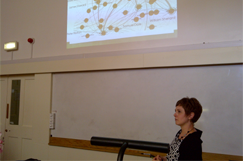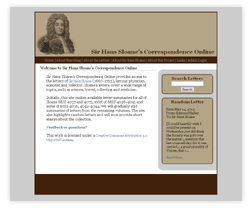Seminar 7: Hans Sloane’s Early Correspondence Networks
Tags: Databases, Eighteenth Century, Hans Sloane, History of Medicine, History of Science, Networks, Seventeenth Century, Visualization

Dr Smith during her talk.
For the seventh and penultimate paper of our seminar series on Thursday 16 June, Dr Lisa Smith (University of Saskatchewan) described her recent efforts towards ‘Visualizing Hans Sloane’s Early Correspondence Networks’. Despite neglect in the historiographies of medicine and science, Smith described Sloane as a facilitator or ‘supermediator’ central to the activities of the early Royal Society as well as the lives of his patients, who corresponded voluminously despite his small number of formal publications. Indeed, Smith is in the process constructing a relational database of Sloane’s many letters – Sir Hans Sloane’s Correspondence Online – which she demonstrated during the talk, and which provided the raw data for the network visualizations. Emphasising that the resource is a work in progress (although an impressive 1,641 letters have been catalogued so far), Smith described the ‘back’ and ‘front’ ends of the catalogue – like our own digital resource, a sophisticated editorial interface sits beneath the search and browse functions – which allows users to explore and filter the Sloane corpus by a full range of standard epistolary metadata as well as a variety of medical themes and keywords, both contemporary and modern. Transcriptions are also being made available, while digital images of the original manuscripts are also in the pipeline. In the second half of her talk, Smith used visualizations of the data created with the recent Yifan Fu algorithm to explore several of the most interesting networks revealed by the correspondence; a surprisingly continental set of relationships, in which connections of patronage, marriage, and friendship loom large. Smith concluded by arguing that network visualizations derived from large datasets are vital in revealing intricacies and overlaps between groups of individuals which would not otherwise have been perceivable, and are of special value in highlighting clusters of relationships (or networks within networks) which can then be reconstructed in more detail. Seminars take place in the Faculty of History on George Street on Thursdays at 3pm. For future talks in the series, please see the seminar webpage.
Podcast now available on the seminar page!



 Join
Join 